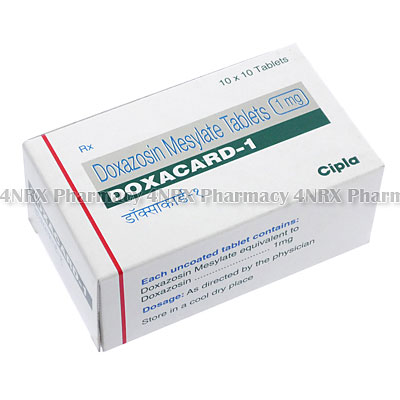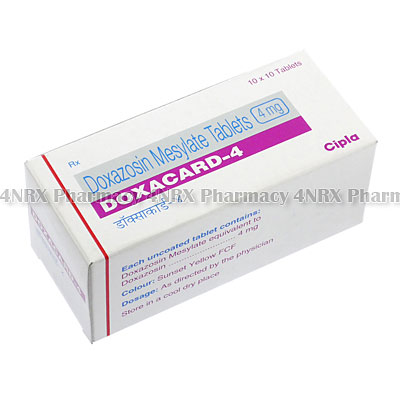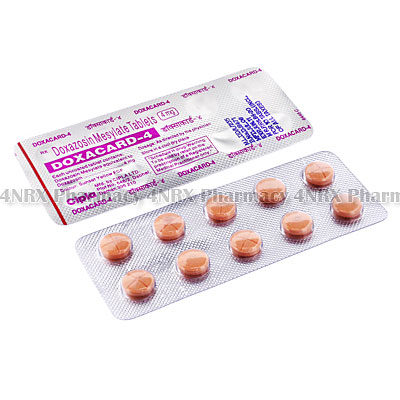 |
Home  Heart Heart  Doxacard (Doxazosin) Doxacard (Doxazosin) |
|
|||||||||
|
Doxacard (Doxazosin)
What is Doxacard (Doxazosin) used for? Doxacard (Doxazosin) is used in the treatment of prostatic hyperplasia. Prostatic hyperplasia is a condition in which the prostate gland grows larger and presses on the urethra, threatening to block the flow of urine. It relieves symptoms such as a weak stream, incomplete emptying of the bladder, frequent urination, and burning during urination. This medication may also be used to treat high blood pressure. It is effective when used alone or in combination with other blood pressure medications. How should I use Doxacard (Doxazosin)? The typical starting dose for Doxacard (Doxazosin) is 1mg taken once each day to minimize the potential for dizziness or fainting associated with the medication. This may occur between 2 and 6 hours after a taking the tablets. After the effects of the starting dose are measured, your doctor may increase the daily dose to 2mg or 4mg if necessary. Patients with high blood pressure may be instructed to take up to a maximum of 16mg. Tablets should be taken whole with or without food with a full glass of water. Do not split, dissolve, crush, or chew the tablets as this will alter the release of medication. What are the side effects of Doxacard (Doxazosin)? Common side effects experienced by patients using Doxacard (Doxazosin) may include:
Side effects that worry you, are persistent, or are intense should be disclosed to your doctor as soon as they occur. It may be necessary to alter your treatment or seek medical assitance. Please Note Doxacard (Doxazosin) can cause low blood pressure, especially when you first start taking the medication and when dosage is increased. This can cause you to become faint, dizzy, or light-headed, particularly when first standing up. You should avoid driving or any hazardous tasks where injury could occur for 24 hours after taking the first dose, after your dose has been increased, or if the medication has been stopped and then restarted. In rare cases, men taking drugs such as Doxacard have developed priapism - a painful, long-lasting erection that persists for hours. This condition can lead to impotence so if it occurs, contact your doctor right away. Doxacard may lower blood counts. Your doctor will most likely monitor your blood counts while you are taking this medication. If you have liver disease or are taking other medications that alter liver function, your doctor will monitor you closely when you take this medication. Strictly use Doxacard as prescribed and follow all instructions provided by your doctor. Safe, suitable, and optimum dosage can vary and is dependent on the patient's health and medical history, as well as the condition you are treating. This medication may not be safe or suitable for all patients. Always ensure you doctor is informed if you are pregnant or breastfeeding, using any other type of medication (including non-prescription medicine, vitamins, and supplements), as well as if you have any allergies, other illnesses, or pre-existing medication conditions. Seek immediate medical attention or proceed to your nearest accident and emergency department if you suffer a hypersensitive or allergic reaction. Symptoms usually present during a reaction of this nature include difficulty breathing or swallowing, swelling of the limbs or face, tight chest, hives, and skin rashes. 





|
|||||||||||||||||